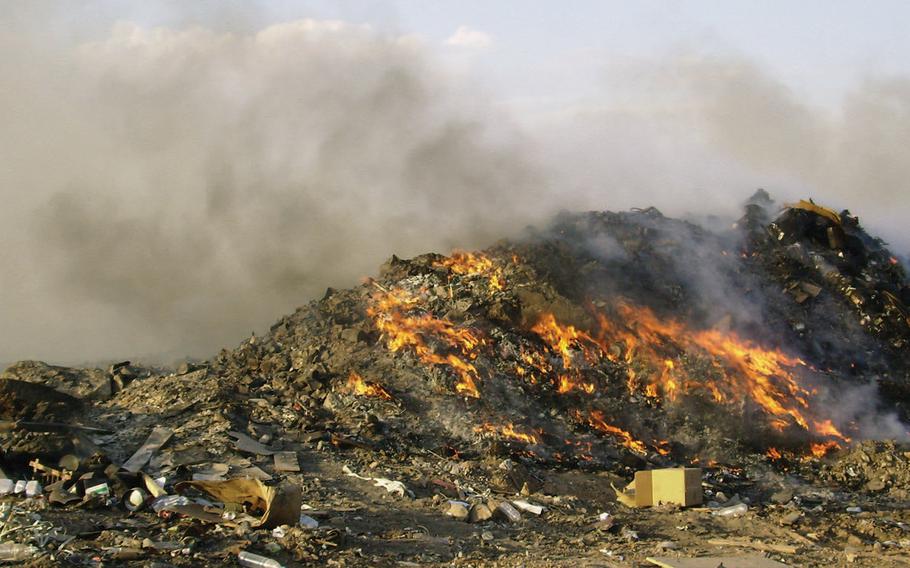
The House passed the Burn Pit Registry Enhancement Act on Wednesday, March 7, 2019, with a vote of 416-0. It would allow family members of deceased servicemembers and veterans to enter cause of death in the registry. (U.S. Army Public Health Command)
WASHINGTON — The House unanimously approved a bill this week to make the Airborne Hazards and Open Burn Pit Registry a more useful tool for researching the health effects of toxic exposure on servicemembers and veterans.
The House passed the Burn Pit Registry Enhancement Act on Wednesday with a vote of 416-0. It would allow family members of deceased servicemembers and veterans to enter cause of death in the registry. As of now, only registered individuals are allowed to update their health information.
The change was recommended by veterans groups, including Burn Pits 360, which has expressed concerns that the registry hasn’t been used to his fullest potential.
“According to Burn Pits 360, without tracking [causes of death] ... the registry’s ability to establish mortality rates related to conditions and diseases associated to toxic exposure will be precluded,” said Rep. Phil Roe, R-Tenn., the ranking Republican on the House Committee on Veterans’ Affairs.
Pits were used until 2010 at U.S. military bases in Iraq and Afghanistan to burn trash, human waste, petroleum, rubber and other debris, releasing hazardous fumes into the air. Some servicemembers exposed to the smoke have attributed medical conditions, such as respiratory issues and cancer, to it.
The burn pit registry, run by the Department of Veterans Affairs, was created in 2014 to collect health information voluntarily from Iraq and Afghanistan veterans. It includes more than 170,000 troops.
Rep. Raul Ruiz, D-Calif., and Rep. Brad Wenstrup, R-Ohio, both medical doctors, lead the congressional Burn Pits Caucus and sponsored the Burn Pit Registry Enhancement Act. While lawmakers approved the bill Wednesday with little controversy, Ruiz is setting his sights on more drastic changes –- and he’s anticipating a fight with the VA.
“The burn pit registry is a proactive thing veterans can do to feel empowered and share information, to have a communication mechanism,” Ruiz said. “The registry is not an end-all.”
In the next two or three months, Ruiz plans to introduce more legislation to secure benefits for veterans exposed to burn pits, he said.
One bill would place veterans with exposure to burn pits into priority group six for VA health care. When veterans try to enroll for VA health care, they’re placed into priority groups based on their need. Burn pit exposure is not part of that arrangement.
Group six now includes some Vietnam veterans, along with those who served in the Persian Gulf War and at Camp Lejeune in North Carolina.
Another bill Ruiz is drafting would add lung diseases from burn pit exposure to a list of conditions presumed to be caused by military service. The action would fast-track VA benefits for veterans suffering from those diseases. It would mark the first time veterans with burn pit exposure would be entitled to such treatment from the VA. When creating presumptions, the agency typically has a high bar for scientific evidence to link diseases with military service.
“We don’t have time for that,” Ruiz said of waiting for more medical studies. “There’s enough evidence right now to determine that there’s a high suspicion. We have veterans who are dying, so we need to act on that suspicion.”
Some Vietnam veterans are still attempting to secure VA benefits for exposure to Agent Orange. “Blue Water” Navy veterans, those who served on ships off the coast of Vietnam during the war, have fought for years to prove they were exposed to the dioxin-laden herbicide. The VA has opposed their efforts, citing high costs and insufficient scientific evidence. A federal court ruled in January that Blue Water veterans are eligible for VA benefits. The government has until later this month to appeal the decision to the Supreme Court.
Ruiz didn’t have a cost estimate for his legislation.
“I think that because we’ve been through this song and dance before with Agent Orange, that’s why we need to introduce legislation right away,” he said.
Besides lung diseases, some veterans suffering from cancers and autoimmune diseases have said they believe the ailments were caused by their exposure to burn pits. Ruiz said he plans to tackle those issues in the future.
“This isn’t one chemical causing a specific syndrome or illness,” Ruiz said. “These are hundreds of different chemicals that are producing a variety of illnesses.”
wentling.nikki@stripes.com Twitter: @nikkiwentling